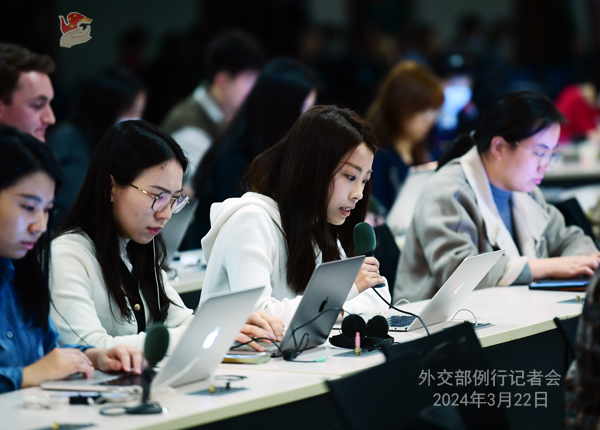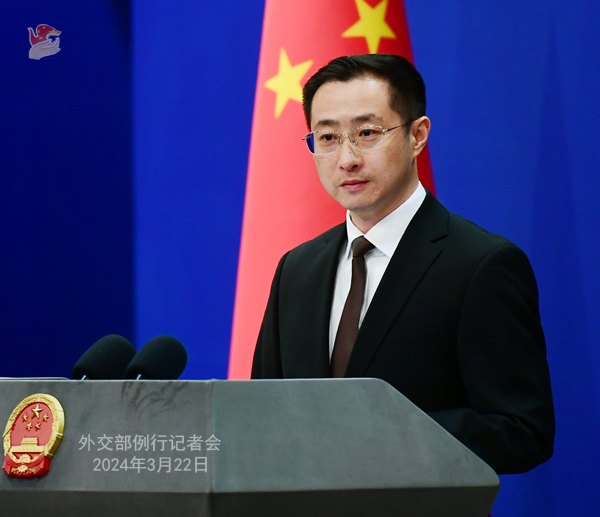
At the invitation of Premier Li Qiang of the State Council, Prime Minister of the Democratic Socialist Republic of Sri Lanka Dinesh Gunawardena will pay an official visit to China from March 25 to 30.
At the invitation of Member of the Political Bureau of the CPC Central Committee and Minister of Foreign Affairs Wang Yi, Nepal’s Deputy Prime Minister and Minister for Foreign Affairs Narayan Kaji Shrestha will pay an official visit to China from March 25 to April 1.
People’s Daily: China announced that Nauru President Adeang will visit China. Can you brief us on the arrangements of Nauru President’s upcoming visit and China’s expectation?
Lin Jian: This visit will be Nauru President’s first state visit to China after China and Nauru reestablished diplomatic ties in January this year. China stands ready to work with Nauru to take this visit as an opportunity to cement political mutual trust, expand exchanges and cooperation across the board, deepen the friendship between our two peoples and further advance our bilateral relations.
China Daily: At a meeting on March 20, the government of Ukraine decided to scrap the “International Sponsors of War” list made and published by Ukraine’s National Agency on Corruption Prevention. What is China’s comment?
Lin Jian: China’s position on the Ukraine issue is consistent and clear. We always stand on the side of peace and justice. Regarding the listing of Chinese companies by relevant Ukrainian institution, we have made clear our firm opposition. China welcomes the canceling of the list by Ukraine.
Reuters: The UN Security Council is supposed to vote today on whether to extend the mandate for the UN panel on experts on North Korea. Does China support extending that mandate?
Lin Jian: I’m not aware of that.
CNR: China just announced Sri Lanka’s Prime Minister Dinesh Gunawardena’s visit to China. What’s China’s arrangements and expectations of this visit?
Lin Jian: Prime Minister Dinesh Gunawardena has visited China several times and greatly contributed to the growth of China-Sri Lanka relations. During this visit, President Xi Jinping will meet with him, and Premier Li Qiang and Chairman Zhao Leji will meet and have talks with him respectively. The leaders of the two countries will have an in-depth exchange of views on carrying forward traditional friendship, deepening political mutual trust, expanding practical cooperation, and international and regional issues of common interest.
China and Sri Lanka are traditional friends and neighbors. Since the establishment of diplomatic ties in 1957, the two countries have always stood together and moved ahead shoulder-to-shoulder, setting a good example of equality and friendly relations between countries. In recent years, the two countries have had frequent high-level interactions, advanced political mutual trust, strengthened exchanges and cooperation in economy, trade, people-to-people exchange, and other fields, and maintained sound communication and coordination on regional and international affairs. Last October, President of Sri Lanka Ranil Wickremesinghe attended the Third Belt and Road Forum for International Cooperation in China. President Xi Jinping had an in-depth exchange of views with him and they reached important common understandings on developing the bilateral relations.
China attaches great importance to its relations with Sri Lanka. We stand ready to work with Sri Lanka to implement the important common understandings reached by leaders of the two countries, expand exchange and cooperation in various fields, including high-quality Belt and Road cooperation, and strive for new progress in the strategic cooperative partnership featuring sincere mutual assistance and ever-lasting friendship.
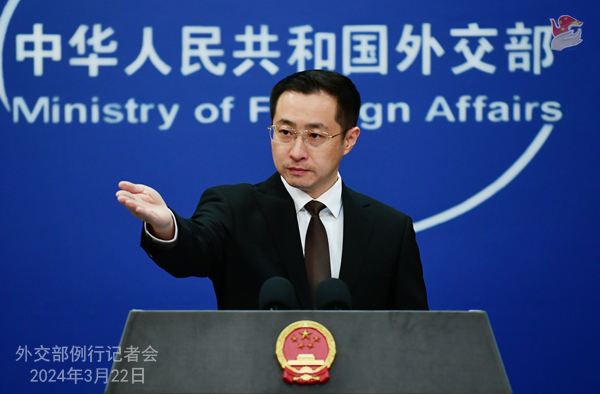
CCTV: China has recently faced headwinds when exporting its electric vehicles. Not long ago, the EU announced customs registration of electric vehicles imported from China, and will probably impose retroactive tariffs on relevant vehicles. The UK and the US are ready to launch an anti-subsidy probe into Chinese electric vehicles or an investigation into the national security risks posed by them. US Treasury Secretary Janet Yellen said that the government is taking steps to ensure the success of America’s electric vehicle industry. What’s your comment?
Lin Jian: Electric vehicle is a globalized industry. Only division of labor and cooperation can bring mutual benefits, and only fair competition can bring technological progress. Advocating protectionism and establishing trade barriers in the name of “fair competition” and “national security” goes against the principles of market economy and WTO rules. In the short term, some countries will seemingly take advantage of these practices, but what they protect are their underdeveloped industries, what they lose is their future development, and what they reap is lose-lose. In the long term, the interests of their industries and customers will be affected, and the global transition to a green economy and the fight against climate change will be undermined. In fact, the automobile industries in the US and Europe have expressed opposition to these practices. Many European automobile executives and business associations believe that the West should not fear Chinese electric vehicles, and restrictions such as levies cannot help solve the challenges that stifle their competitiveness.
I want to stress that the popularity of Chinese electric vehicles relies on our technological innovation and superb quality in the midst of global competition rather than subsidies. Meanwhile, China has abolished all market access restrictions on foreign investment in manufacturing and remains open to international car makers who can fully share in the dividends of China’s big market. In 2023, China was the second largest market for Tesla who sells over 600,000 vehicles with a year-on-year increase of 37.3 percent in retail sales and generates USD 21.75 billion of revenue. Mercedes Benz, BMW and Volkswagen have been household names in China. Reports say that as the West feels unsettled by the exports of Chinese electric vehicles, one Volkswagen vehicle is sold every 10 seconds in the Chinese market.
Economic globalization is a major trend, protectionism is never a good option, and abuse of trade remedies contravenes international trade rules. Only through mutually-beneficial cooperation can we make the pie bigger; only by transcending zero-sum game can we achieve win-win. We hope relevant parties will listen carefully to the rational voice from the industry, earnestly observe WTO rules, respect market economy laws, stop turning economic and trade issues into political, security or ideological issues, and provide an open, fair, just and non-discriminatory environment for the investment and operation of businesses from all countries, including China.
TASS: It’s reported that China has reached an agreement with Yemen’s Houthis on unimpeded shipping in the Red Sea. What’s the Foreign Ministry’s comment?
Lin Jian: The Red Sea is an important international trade route for goods and energy. China calls on relevant parties to jointly protect the safety of the shipping lanes in the Red Sea in accordance with the law and earnestly respect the sovereignty and territorial integrity of the coastal countries along the Red Sea. China will continue to play a constructive role and make contribution to the early restoration of peace and stability in the Red Sea.
Bloomberg: The Houthis have said that the ships of China and Russia will be allowed to sail through the Red Sea without being attacked. And this is as a result, according to these people, talks between Chinese and Russian diplomats, and one of the Houthis’ top political figures. So the question is, did this happen? Can you confirm that Chinese diplomats spoke with the Houthis? Did you agree on the situation? And also, it’s reported that in exchange for this agreement, China and Russia have agreed to provide more political support to the Houthis. So my question basically is, can you give more details? And was this exchange an understanding that China will support politically the Houthis going forward?
Lin Jian: I’ve stated China’s position and have nothing more to offer.
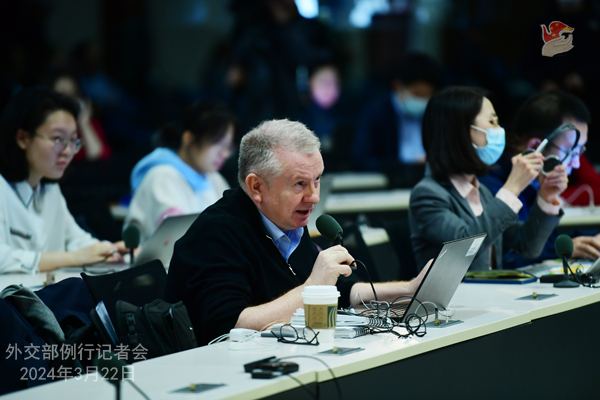
CCTV: You just announced that Nepal’s Deputy Prime Minister and Minister for Foreign Affairs Shrestha will pay an official visit to China. How does China view the current China-Nepal relations? What’s China’s expectation of the visit?
Lin Jian: China and Nepal are traditional friends and neighbors linked by mountains and rivers. In recent years, our two countries maintained close high-level exchanges with deepening practical cooperation in various fields. Our two sides maintained close coordination and collaboration in regional and international affairs. Last September, Prime Minister Prachanda paid an official visit to China and leaders of the two countries reached important common understandings on growing the China-Nepal relations.
The upcoming visit will be Mr. Shrestha’s first overseas visit after taking office as Nepal’s Deputy Prime Minister and Minister for Foreign Affairs. China stands ready to work with Nepal to take this visit as an opportunity to further deliver on the important common understandings between leaders of the two countries, deepen political mutual trust, pursue high-quality Belt and Road cooperation, expand exchanges and cooperation in various areas and strive for new progress in building China-Nepal strategic partnership of cooperation featuring ever-lasting friendship for development and prosperity.
AFP: The United Nations Security Council will vote today on a draft resolution submitted by the United States calling for the need for an immediate ceasefire in Gaza. So could you tell us how China views this draft resolution and how it plans to vote?
Lin Jian: The ongoing Palestinian-Israeli conflict is still raging, which inflicted a severe humanitarian crisis. The international community expects the Security Council to earnestly fulfill its mandate. China supports the Security Council in taking more responsible and meaningful actions as soon as possible and working relentlessly to realize an early cessation of hostilities in Gaza, ease the humanitarian situation and implement the two-State solution. We believe that on the Palestinian-Israeli question, we must respect facts and history, listen to and respect the position and aspiration of Arab countries, realize an early ceasefire, ease the humanitarian situation and implement the two-State solution. This is the yardstick to assess the Security Council’s actions and decisions.
Shenzhen TV: The Prime Minister of Eswatini Russell Mmiso Dlamini visited Taiwan recently, during which he met with Tsai Ing-wen, Lai Ching-te and “Premier of the Executive Yuan” Chen Chien-jen, attended the welcome dinner hosted by head of Taiwan’s foreign affairs office Wu Jaushieh, visited Taiwan’s companies and universities and held the Seminar on Exploring Investment Opportunities in the Kingdom of Eswatini. What is China’s comment on this?
Lin Jian: We noted the recent visit to Taiwan by the Prime Minister of Eswatini Russell Mmiso Dlamini. This is a grave provocation to the one-China principle and China’s sovereignty. China firmly opposes this.
There is but one China in the world, Taiwan is an inalienable part of China’s territory, and the government of the People’s Republic of China is the sole legal government representing the whole of China. This is a prevailing international consensus that brooks no challenge. On the visit to Taiwan by the Prime Minister of Eswatini, I would like to stress the following two points:
First, over the past 56 years of the so-called “diplomatic ties” between Eswatini and the Taiwan region, the people of Eswatini hardly received any tangible benefits and Eswatini’s national development hardly achieved any progress. We believe the people of Eswatini know this well. The Taiwan authorities squander the taxpayers’ money to support some bigwigs in Eswatini to maintain the so-called “diplomatic ties.” This kind of relationship is worth nothing to people in Taiwan and in Eswatini.
Second, over 180 countries and international organizations reaffirmed their commitment to the one-China principle after the elections in the Taiwan region. Recently, Nauru reestablished diplomatic ties with China, cutting the number of countries that have the so-called “diplomatic ties” with the Taiwan region to only 12. Undeniable facts once again show that one China is where global opinion trends and the arc of history bends. Certain persons in power in Eswatini run counter to the trend of the times and maintain the so-called “diplomatic ties” with the Taiwan region. Such moves find no support and will not persist.
We believe that the people of Eswatini will see clearly the truth about “Taiwan independence” and recognize the perils of the deformed “dollar diplomacy” between Taiwan and Eswatini. We urge certain persons in power in Eswatini to see squarely the prevailing consensus in the international community, refrain from being self-deceptive or deliberately undermining the one-China principle, which is a basic norm governing international relations, and realize their errors and mend their ways as soon as possible.
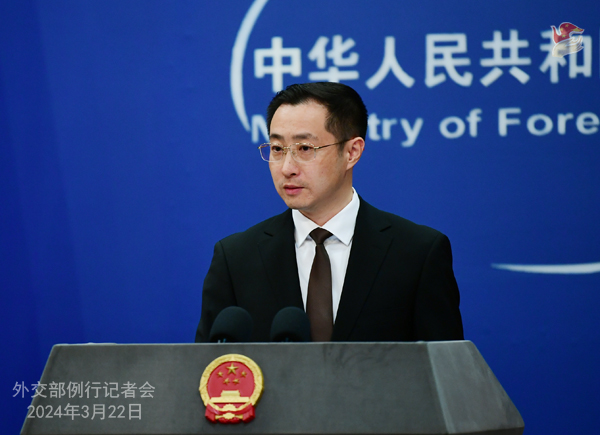
Bloomberg: I believe there was a press conference or a meeting this morning between Li Hui and some diplomats and some representatives of the press from 18 countries, but not everybody from the media organizations was there. So could you give me a brief in terms of what was the main message from Li Hui? What was the deliverable from this trip to Ukraine and the European countries?
Lin Jian: Special Representative of the Chinese Government on Eurasian Affairs Li Hui held a press briefing on March 22 and shared with diplomatic envoys and Chinese and foreign press representatives information on the second round of shuttle diplomacy on the Ukraine crisis. China has released a readout which you may refer to. I’d like to also share with you relevant information at the press conference.
Special Representative Li Hui elaborated on his in-depth exchange of views with various parties on how to achieve an early ceasefire and political resolution of the crisis and other issues during his visit to Russia, Ukraine, and other relevant European countries. Li Hui said that all parties commended China’s efforts on mediation and expected China to play a more constructive role. They agreed that as a permanent member of the UN Security Council and a friend of both Russia and Ukraine, China is in a good position to mediate between the two countries and among various parties, convey information, and encourage all parties to seek common ground while shelving differences, build consensus and build up favorable conditions for peace talks.
Special Representative Li Hui also stressed China supports the holding in due course of an international peace conference that is recognized by both Russia and Ukraine and ensures the equal participation of all parties and fair discussions on all peace plans. We stand ready to continue playing our unique role and contributing China’s wisdom and strength to the political settlement of the crisis.
PTI: Just like to seek a clarification about the China-Russia-Houthis deal that you talked about here. Does this particular deal get extended to any other countries or probably confined to just China and Russia?
Lin Jian: I just stated China’s position.
Bloomberg: I just want to ask about the China Development Forum which begins over the weekend on Sunday and Monday in Beijing. I’m wondering if you have any details about who might be some of the top leaders or speakers at that event. Do you have any information regarding Chinese government officials, and top leaders, especially those who might speak at that event?
Lin Jian: China will release relevant information in due course. Please stay tuned.
